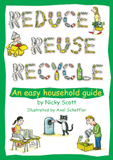Books recycle: Recycling is the reprocessing of materials into new products. Recycling prevents useful material resources being wasted, reduces the consumption of raw materials and reduces energy usage, and hence greenhouse gas emissions, compared to virgin production.
Recycling is beneficial in two ways: it reduces the inputs (energy and raw materials) to a production system and reduces the amount of waste produced for disposal.
Some materials like aluminum can be recycled indefinitely as there is no change to the materials. Other recycled materials like paper require a percentage of raw materials (wood fibers) to be added to compensate for the degradation of existing fibers.
The resources being processed are purer, less energy is needed to process them and less energy is needed to transport from the place of extraction (e.g. bauxite/aluminium ore mines in Brazil or coniferous forests in Scandinavia).
This reduces the environmental, social, and usually the economic costs of manufacturing.
For example, bauxite mines in Brazil displace indigenous people, create noise pollution from blasting, machinery and transport, and create air pollution in the form of particulates (dust). The habitat loss and visual destruction is also negative both to the aesthetic qualities of the areas and the local environment. However, the mines do provide employment and revenue to the local population and economy, promoting development of the country as a whole.
Recycling aluminium saves 95% of the energy cost of processing new aluminium because the melting temperature is reduced from 900 °C to 600 °C. It is by far the most efficient material to recycle.
The most commonly used methods for waste disposal (landfill, pyrolysis, incineration) may be environmentally damaging and unsustainable. Therefore any way to reduce the volume of waste being disposed in this fashion may be beneficial. The maximum environmental benefit is gained by waste minimization (reducing the amount of waste produced), and reusing items in their current form such as refilling bottles.
See here the items that were being reused from a New York refuse site in 1899, over a 100 years ago!

This easy to use guide has the answers to all your recycling questions. Use its A-Z listing of everyday household items to see how you can recycle most of your unwanted things, do your bit for the planet, and maybe make a bit of money while you’re at it.
